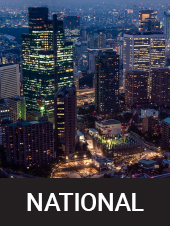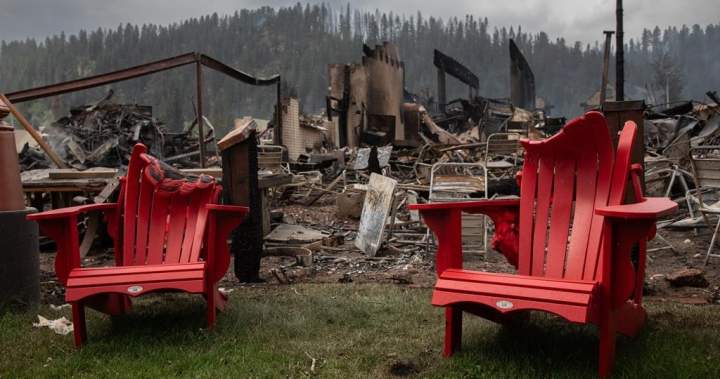Global News is in Jasper this week to cover where the recovery is at, and what still needs to be done. Watch our coverage above and below.
One year ago at the height of tourist season, scores of visitors and townsite residents fled Jasper and the surrounding national park as nearby wildfires grew.
They would eventually merge and blaze a path of destruction through the scenic Alberta mountain town.
This week, residents and first responders are gathering in Jasper National Park to mark the event.
“Some of you may be attending today with some measure of apprehension or trepidation, fearful perhaps, that some remark or reflection may trigger an intense and unwelcome reaction,” Mayor Richard Ireland told 150 people at a commemoration ceremony Tuesday in town park.
“Some residents who have returned home to Jasper may have intentionally stayed away Tuesday morning to avoid that very risk.
“My hope, and I expect yours, is that in paying homage to all that we’ve been through, in recognizing our progress and our successes, in commemorating this sad anniversary, we do not stir too much.”
Ireland and other leaders made remarks. Some in the crowd wore Jasper Fire Department shirts, others in Parks Canada gear.
The ground was wet from the previous night’s rainfall and the event was set against a backdrop of low-hanging clouds, a contrast to the heavy smoke and ash that blanketed the town just one year earlier. A thin layer of snow covered nearby mountain peaks.
Ireland said the challenges of rebuilding lie ahead and are magnified by the fact the end is not in sight.
On July 22, 2024, a swiftly-racing wildfire forced 25,000 visitors and town residents to leave, jumping in their cars in the dark of night to flee to safety on one smoke-choked highway.
Two days after the park was emptied of all but essential and emergency workers, shifting winds and towers of flame showered the townsite with embers that lit new fires — destroying a third of all structures in a capricious assault that left intact homes standing alongside piles of rubble.
Hikers recall backcountry rescue as emergency crews unable to save own homes
While thousands of residents and tourists like campers and hotel guests were able to flee themselves, there were people in the backcountry who didn’t even know they were in danger.
“Behind the scenes, all of our friends were calling 911, telling them to come get us,” said Katelyn Bellerose.
One year ago, she was on day two of a scorching hike and, unbeknownst to the group, headed directly towards the wildfire.
The group was among the hundreds of people rescued from the backcountry during the July 2024 wildfire.
People needing to be saved from the woods isn’t a rare occurrence, but Timothy Johnson with Parks Canada visitor safety said the fire added a new layer of complexity to what would have been a routine rescue mission.
“The high winds, the smoke, the lack of visibility, the multiple aircrafts flying around,” Johnson said.
While emergency crews worked to save the town, eight people on the fire crew lost their homes to the flames, including fire chief Mathew Conte.
“Tough decision, knowing your house is on fire but there’s absolutely nothing to do. There was a larger purpose at hand,” he said.
In the moment, emergency crews focused on the task at hand but in the quiet aftermath, the mental anguish followed.
“There were tears from the majority of the members, especially the next day, when we realized the overall loss to the community.”
Rebuild efforts continue amid housing challenges in Jasper townsite
The wildfire destroyed hundreds of homes in Jasper and a year later, the vast majority remain empty lots.
Around the townsite, evidence of Mother Nature’s wrath is unmistakable. But what isn’t so visible is the mental and emotional devastation.

Get breaking National news
For news impacting Canada and around the world, sign up for breaking news alerts delivered directly to you when they happen.
Resident Michal Wasuita said he lost more than just his home — he also lost his community.
“We are all dispersed. I don’t know where my friends are. I don’t know what their kids are doing. I’ve lost so many acquaintances.”
About 5,000 residents and 20,000 visitors were safely evacuated before the fire breached the western edge of town and destroyed 350 homes and businesses, including 820 housings units.
The Insurance Bureau of Canada pegged the damage at $880 million.
Empty foundations that smouldered for more than a week after the fire have been filled with dirt. Homes are beginning to be rebuilt but the vast majority of the lots remain empty.
About 350 temporary housing units are scattered throughout townsite.
It’s a mix of duplex-style trailers that can accommodate two smaller families or one large one, along with a large dormitory style camp just outside of town.
But demand outweighs supply.
Jasper Recovery Coordination Centre manager Doug Oltof said there were 700 applications for interim housing.
“We would definitely benefit from more interim housing, and we’re working on doing that,” Oltof said.
“We’re in the process of bringing in additional housing units over the course of the next three or four months. And we’ll continue to work towards meeting the full demand.
“It remains to be seen whether we’ll actually get to the point of offering housing to everybody who’s in need.”
Just over half of applicant households have received interim housing and Oltof said who gets picked is a difficult process.
“We consider everyone in the community essential to the community, but we are faced with a shortage of housing. Demand outstrips supply, so we have to make very difficult decisions about where we make the offers first. ”
Parks Canada has a mandate to ensure the safe functioning of the park and Oltof said they understand the symbiotic relationship between the park and the town, which has to be able to function safely for the park to function safety.
Firstly, people who work in jobs that are critical to keeping the town and park safe are top of the list.
“We go from there and look at all the other occupations, all the other functions that support those critical functions for the town and the park.”
From there, they look at the recovery and rebuild of the community, both physically and emotionally.
“We look at the occupations that make all that possible, and that includes the tourism sector, that includes all of the various community functions that support our community coming together and being together, and it includes everyone who works in those construction, contracting functions that needs to be housed as well.”
Those who were not selected face imperfect solutions, like a two-hour round trip from Hinton every day or camping indefinitely.
“We can’t expect a rebuild to happen in the first year — it’s a multi-year process,” Oltof said.
Wasuita said the unseen damage will be harder to fix and move past.
“The absolute catastrophic loss of everything we, collectively, have owned and spent our years building up… To be destroyed in just a matter of hours was just traumatic.”
“You spend a lifetime developing relationships, collections — destroyed in a matter of hours. The loss is gut-wrenching. The town as a whole has lost something.”
WATCH BELOW: Morgan Black has more on the scale a rebuild requires.
Return of tourism to Jasper essential for town survival
Jasper is known for being a picturesque destination drawing in visitors not just from elsewhere in Alberta, from around the world.
When the wildfire ripped through the town, many wondered what it would mean for an industry that keeps Jasper running.
Jasper is not the first Alberta municipality to be devastated by wildfire, but it was the first in a tourism-reliant community.
A 2016 fire that ripped through Fort McMurray, destroyed about 2,400 homes, far more than the 318 structures lost in Jasper. While one-third of the town’s structures were decimated by the fire, large parts of Jasper remain intact.
Winter was sleepier than normal in Jasper, even with the Marmot Basin ski resort open (it wasn’t impacted by the fire), and now, the tourist-reliant town needs visitors this summer and fall.
Between campsite closures and several hotels that were destroyed in the fire, less space for tourists would likely result in a 20 per cent decline in business revenue, the Jasper Chamber of Commerce told town council this past spring.
Nevertheless, over the past year of rebuilding the community has stressed one message: it is open for business. Tourists are encouraged to visit the mountain town to help the sector recover. Those who have say the damage aftermath is sobering.
“When somebody’s describing it to you, it’s hard to put into imagination what it was really like until you get here,” said Cam Clark, an American tourist from Indiana who brought his family up to see the Canadian Rockies.
“Seeing the empty lots where homes used to be, all the charred trees … The fact that they have bounced back the way they have is really a testament to their resiliency.”
Most of the town’s commercial strip wasn’t impacted and the residential neighbourhood on the east side of town was also untouched.
“You wouldn’t know it, that it really took a big part of the town unless you were told ahead of time because of how good the town looks in such a good period after the fires,” Clark said.
This month, the sidewalks of the main strip have been bustling: tourists line the streets, restaurants and stores are busy and things look to be returning to normal.
Kimberly Stark is the owner of Bear’s Paw bakery — a staple in the community for 28 years. The business was untouched by the flames but Stark, also a the volunteer firefighter, watched her own home burn down.
“I take my daughters — we go to our lot, so that we’re still familiar with it being our neighbourhood.
“I had a little cry the other day.”
There were electricity and refrigeration issues at the bakery following the fire. To get it completely back to normal took 352 days.
However, Stark said that hasn’t mattered to visitors. After the wildfire, she got thank-you cards from longtime customers.
“Amazing that they recognized us and that we make a difference.
“It’s just coffee, we’re not saving lives.”
Stark worries if tourists’ love will carry on when support is needed most.
“Summer, it’s easy, right?” she said. “What about winter? What about next summer?”
WATCH BELOW: Jasmine King has more details in the video below.
— with files from Jasmine King and Morgan Black, Global News and Matthew Scace, The Canadian Press
Read the full article here


